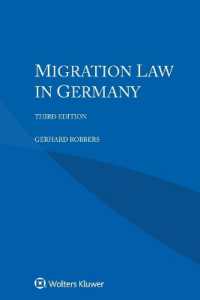- ホーム
- > 洋書
- > 英文書
- > Computer / General
Full Description
The two-volume set, LNAI 16221 and 16222, constitutes the proceedings of the 4th Mexican International Conference on Artificial Intelligence, MICAI 2025, held in Guanajuato, Mexico, November 3, 2025
The 65 full papers presented in these proceedings were carefully reviewed and selected from 119 submissions. The papers presented in these two volumes are organized in the following topical sections:
Part I - Machine Learning; Natural Language Processing and Neural Networks.
Part II - Applications; Pattern Recognition; Computer Vision & Image Processing and Bioinformatics & Medical Applications.
Contents
.- Machine Learning.
.- Spatially Distributed Learning.
.- Predicting Substance Addiction in University Students: A DSM-5-Guided Machine Learning Model..
.- Anomaly detection in ultrasound tomography images using Convolutional Neural Networks.
.- Prompt Assisted Enhancement for Correcting Illumination Artifacts in Endoscopic Images.
.- Mel-Spectrogram Reconstruction from Video Lip Sequences using an Autoencoder Architecture.
.- Comparison of nonlinear and linear data-driven Takagi-Sugeno models of a bioreactor.
.- Water Quality Classification via Cost-Efficient Machine Learning: A Case Study in Nuevo Le'on.
.- Water Quality Assessment with Machine Learning Techniques in Jalisco, Mexico.
.- MNIST Dataset Classification via Multiview Topological Data Analysis.
.- Classification of generalized anxiety through life history strategies with Random Forest and explainable machine learning.
.- From Anamnesis to Algorithm: A Clinical Framework for the Design of Artificial Intelligence Focused on Medical Workflow.
.- Natural Language Processing.
.- A symbolic algorithm for the unification of Nawatl word spellings.
.- On the application of natural language processing tools to the Ramirez Codex.
.- Financial News Summarization: Can extractive methods still offer a true alternative to LLMs?.
.- Applying Natural Language Processing to Short Medical Notes from Mexican Health Units to Detect Suicidal Behaviours.
.- Empowering ESG Insights in Vietnamese through Fine-Tuned Language Models.
.- Toward Bias-Aware and Efficient Offensive Language Detection using QLoRA-Optimized LLaMA and GPT Models.
.- Pragmatic Generalization in LLMs: Insights from Fine-Tuning and Evaluating on Multilingual Sarcasm.
.- WISE: A Machine Learning-Based Tool for Analyzing Heroin and Fentanyl Withdrawal Experiences on Social Media.
.- Sarcasm Detection in Roman Urdu Text: A Comprehensive Study Using Machine Learning and Large Language Model.
.- Think Twice Before Deciding: A Two-Stage Method for Sexism Detection on Social Media.
.- Automatic synthetic data selection for highly unbalanced multi-class and multi-label Obstetric Violence Classification.
.- Multi-document Update Text Summarization Based on Sentence Features Focus on Requirements.
.- A Multi-Stage Pipeline for Reliable LLM-based Robotic Task Planningusing Schema-Aligned Parsing and Knowledge Base Grounding.
.- Tec-Habilidad: Skill Classification for Bridging Education and Employment.
.- Synthetic Data Generation for Pur'epecha Machine Translation using LLMs.
.- Pre-Trained Models for Grammatical Error Correction in Healthcare-Specific Text.
.- Neural Networks.
.- Relational Inductive Bias Behind Convolutional and Attention Neural Layers.
.- Scholar dropout analysis in Technological Universities Subsystem using neural network-based models: UT-X case.
.- Deep Learning Speech Recognition for Industrial Noise Enviroments.
.- Estimation of urban fractal dimension using a Convolutional Neural Network.
.- Terrain Classification-based Dynamic Trajectory Tracking Controller for Mobile Robots.








